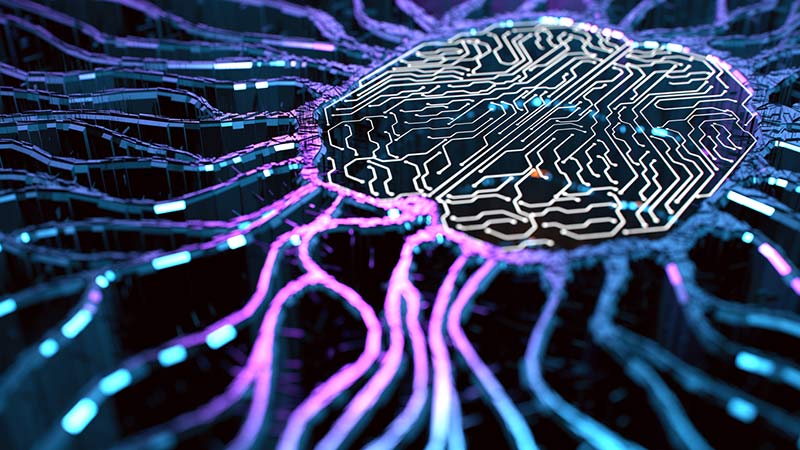Is the Doom Around AI … Artificial?
By
Adriaan Brits
|
Wednesday, 14 June 2023
|
Feature
Since the release of OpenAI's ChatGPT in November last year, it's becoming increasingly clear that a major historical transition is underway. For the first time in our 300,000-year history on this planet, we're finally able to appreciate its significance in real time.
From stone tools to steel swords, from the industrial revolution to the age of computation, humankind may have achieved its most impressive breakthrough to date.

The Age of AI Is Here
Just a few months ago, OpenAI's ChatGPT 3 was relatively unknown outside of Silicon Valley. However, its unveiling propelled it to become one of the fastest-growing apps and companies in history, boasting millions of users each day.
This flagship AI chatbot is capable of impressive feats — it can compose poems, songs, essays, stories, and business proposals, fix code, tackle exams, and even handle tax returns in a matter of seconds.
While the initial amazement at the capabilities of these Large Language Models was widespread, a sense of caution is gradually transforming into fear and panic. An emerging group of AI insiders, known as the "AI Doomers," is raising concerns about the potentially catastrophic consequences of this technology.
AI Doomers: Panicking or Prophetic?
"AI Doomers" are dominating headlines with their apocalyptic views of AI. Some have even argued that we should halt research into Artificial General Intelligence (AGI) due to the risk it poses to humanity.
Statements such as, "If somebody builds a too-powerful AI, I expect every member of the human species to die shortly thereafter" have triggered a wave of fear. Moreover, notable AI insiders like Google DeepMind CEO Demis Hassabis and OpenAI CEO Sam Altman have signed a statement advocating for the mitigation of risks from AI to be a global priority.
Yet, could this be a classic case of tech panic? History tends to repeat itself, and tech panics are nothing new. Could it be that AI “doomerism” is just another manifestation of our tendency to fear and resist change?
A History of Tech Panics
Historically, every revolutionary technology has faced some level of resistance and sparked fears:
- The invention of writing in 3400 BCE was met with concerns about its impact on memory.
- The unveiling of the printing press in the 1400s was feared to lead to an overabundance of books, diverting people from religious texts.
- The introduction of the loom in the 19th century sparked riots from weavers worried about job losses.
Fast forward to the 20th century. From comic books to video games, from heavy metal music to social media, each new cultural or technological innovation has triggered bouts of panic. However, the anticipated catastrophes never materialized, and society quickly moved on to the next technological bogeyman.
With AI, many wonder if this time is different. Are we facing a different kind of animal altogether? Perhaps looking at a seminal moment in the history of AI can give us a clue.
Deep Blue vs. Gary Kasparov: A Lesson From History
In the 1990s, IBM developed an AI supercomputer called Deep Blue, designed to master chess. In 1996, the world watched as Deep Blue took on the reigning world chess champion, Gary Kasparov, in a historic match.
To the shock of the world, Deep Blue defeated Kasparov in their first game. Although Kasparov managed to recover and win the six-game bout, a rematch in 1997 saw Deep Blue triumph, marking a watershed moment in the development of AI.
Yet, contrary to fears that AI would obliterate chess, the game has thrived. Top players have utilized AI chess engines to enhance their knowledge, and chess has never been more popular or profitable, thanks to new tech-savvy generations and exciting chess apps. Humans were not replaced; they were enhanced.
The AI Debate: Doomsayers vs. Utopians
The debate surrounding AI continues. Utopians highlight potential benefits, while doomsayers warn of catastrophic scenarios. This tension can help us evaluate the trade-offs of new technology and perhaps guide us toward sensible protective measures.
Yet, we need to remember that AI is not new. Artificial intelligence has been with us for decades, slowly but surely embedding itself in our lives. As we fully enter the age of AI, our task is to avoid both naive utopianism and existential panic, instead embracing the potential for adaptation and growth that new technologies typically inspire.
About the Author
As an analyst of global affairs, Adriaan has an MSC from Oxford, with diverse interests in the digital economy, entertainment, and business. He is a specialist trainer in Advanced Analytics & Media.

